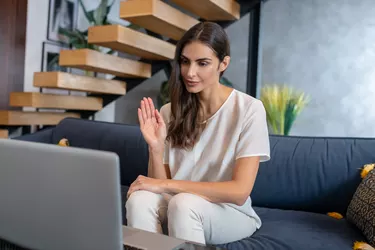
The coronavirus pandemic has had a staggering impact on our country in a lot of ways. It's had an undeniable effect on our mental health, kickstarting or reawakening issues like depression and PTSD for numerous Americans. But maybe you're not dealing with any of these issues. Maybe you're just stressed to the max in the "normal" course of life.
Therapy can put you back on firm ground, but how do you safely do that during a pandemic, or even in the waning days of one? Technology has your back.
Video of the Day
Video of the Day
Mental Health During COVID-19
The Kaiser Family Foundation reported in early 2021 that four in every 10 adults reported experiencing symptoms of anxiety or depression in 2020. That number was up from just one in 10 just a year before. The New York Times has quoted Mental Health America that almost 60 percent of those suffering were unable to get treatment.
These numbers have contributed to a lot more people being willing to talk about what they're experiencing and expose themselves to public opinion. Oprah Winfrey spoke on the Mental Health Coalition's 1-2-1 series and Naomi Osaka spoke on the battle she's waged with depression and social anxiety, both in May 2021. Osaka declined to speak at a required news conference following her first-round win at the French Open, and she ultimately withdrew from the competition. She said at the time that she was "exercising self-care," and she's garnered some significant support, including from Nike, with whom she has a sponsorship.
Most of us don't have to take our woes to the press, but it remains that help and therapy can be hard to access during this time. It can help to think outside the box.
Therapy by Phone or Online
Various forms of "telepsychology" are available, according to the American Psychological Association. You can get professional help via telephone, text message, email or online from your home or office, breathing in your own COVID-uncontaminated air. You might find that you're more relaxed about the whole process when you're on familiar ground, too. And it's time-efficient – you won't lose valuable time commuting to your therapist's office.
Of course, there are a few concerns, and the APA is the first to admit that research into the success of this concept is still relatively new. You're sharing your most personal details and information on an app if you choose online therapy. The APA cautions that you should take steps to verify your therapist's identity if you're not going to be walking up to a physical door with a shingle hanging beside it.
The APA also warns that many online therapy options aren't run by psychologists or licensed therapists. They may not understand that state laws can apply, and this line can be blurred if you're in Kansas talking with a professional in LA.
Therapy by Robot
The New York Times has also reported on "Woebot," an app that was first introduced in 2017 and bills itself as an "automated therapist." The company indicates that the number of its users has effectively doubled since its inception, but try as it might to mimic and interpret "natural language processing," Woebot therapy still operates on artificial intelligence.
It's programmed to use cognitive behavioral therapy and to remember past sessions, but it can't be confused with talking to a live, interactive, understanding human being. The bot could fail to pick up on an emergency situation or to accurately assess the impact of what a patient is saying. Even Woebot defines itself as a "self-help tool" that's designed to help prompt you into figuring out what's ailing you.
How Much Does it Cost?
One problem with these approaches to therapy is that you'll probably have to pay for them out of your own pocket. The APA indicates that teletherapy generally isn't covered by most insurance providers, but check with your company to be sure. It's also possible that the convenience of meeting online with a therapist or on-demand with a robot will cost you more than a visit to a therapist's office.
- American Psychological Association: What You Need to Know Before Choosing Online Therapy
- American Psychological Association: A Growing Wave of Online Therapy
- New York Times: Something Bothering You? Tell It to Woebot
- The 19th News: How Naomi Osaka’s Move Resonates With Young Women in Tennis
- NPR.org: Naomi Osaka Reveals Mental Health Struggles – and Other Athletes Rally Around Her
- Kaiser Family Foundation: The Implications for COVID-19 for Mental Health and Substance Use
- CNN: Nike Backs Naomi Osaka After She Withdraws From French Open
- People: Oprah Winfrey Opens Up About Understanding the Source of Her Mental Health Challenges